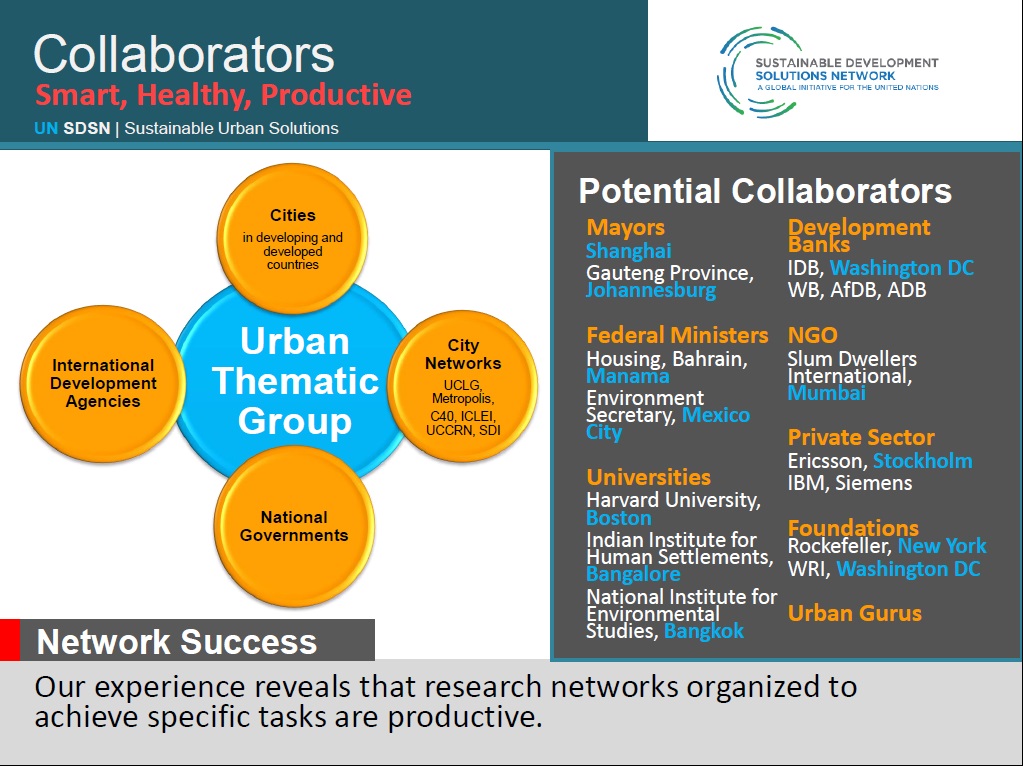 Source: Shagun Mehrotra, 2012
Source: Shagun Mehrotra, 2012November 29, 2012, NEW YORK – Over 70 global leaders from private sector, academia, politics, and think-tanks gathered at this first UNSDSN leadership council meeting held at Columbia University, New York. This marked the beginning of the Solutions network that operates under the auspices of UN Secretary-General Ban Ki-moon to “chart new pathways for sustainable development”.
The Solutions Network mobilizes scientific and technical expertise from academia, civil society and the private sector in support of sustainable development problem-solving at local, national and global scales. Professor Jeffrey D. Sachs, director of the Earth Institute, Columbia University, and special advisor to UN Secretary General Ban Ki-Moon, directs the Solutions Network. Laurence Tubiana, director of IDDRI and professor at SciencePo (France), and Xue Lan, professor and dean of the School of Public Policy and Management at Tsinghua University in China, co-chair the Leadership Council. The Earth Institute hosts the secretariat of the network. The Solutions Network will work closely with United Nations agencies, multilateral financing institutions and other international organizations, and will provide technical support to the High-level Panel of Eminent Persons on the Post-2015 Development Agenda.
Following a talk by Paul Collier, Professor of Economics at The University of Oxford, on good governance of extractive and land resources, Shagun Mehrotra, Professor at the New School and Director of our Sustainable Development Solutions Center, led the discussion on cities, making a case for an Urban Sustainable Development Goal.
Professor Mehrotra presented the Urban Thematic Group strategy for Cities: Smart, Healthy, and Productive—Solutions for a Global Urban Future. He outlined challenges posed by rapid urbanization of poverty, climate change, and infrastructure constraints to sustainable development and offered three types of transformative solutions emerging from private, people, and public action. Further, he explored tradeoffs facing cities including issues of municipal finance under austerity, quality of basic services, climate change risks and responses, youth employment, and role of new technology and institutions for accountability. In conclusion, he outlined composition of major stakeholders and key urban actors with proposed solutions initiatives to be piloted in major cities—one on each continent. The strategy received support and advice from the political leadership of Brazil with an invitation to pilot solution initiatives in Rio de Janeiro, World Resources Institute; UNFPA, EDF, NRDC, Ericsson, African Capacity Building Foundation, among others. Cross-cutting solution linkages with several thematic groups and organizations present for meeting were initiated. The New School University Provost’s Faculty Research Grant supported the participation of Sustainable Development Solutions Center Project Managers Susan Yoon and Matthew Woundy as observers and rapporteurs for the urban thematic group at this high-level meetings.
During the closing session, UN Secretary-General Ban Ki Moon said, “We are at a critical turning point. Imperfect industrial processes and competing priorities on the international agenda make the world’s trajectory unsustainable. Innovative science-based solutions will provide the answer to many of the complex and interlinked challenges that the world faces today. The perspectives offered by the academic and scientific community are paramount to the post-2015 development agenda. The SDSN will provide clarity about what solutions science and technology can offer to today’s problems on a global scale.”
As a follow-up to the first UNSDSN Leadership Council gathering, debriefing and partnership outreach with NRDC, WRI, UN-Habitat, Cities Alliance, and World Bank in Washington DC and New School, in New York City, were initiated to consult key stakeholders, initiate collaboration, and engage key members for the urban thematic group.